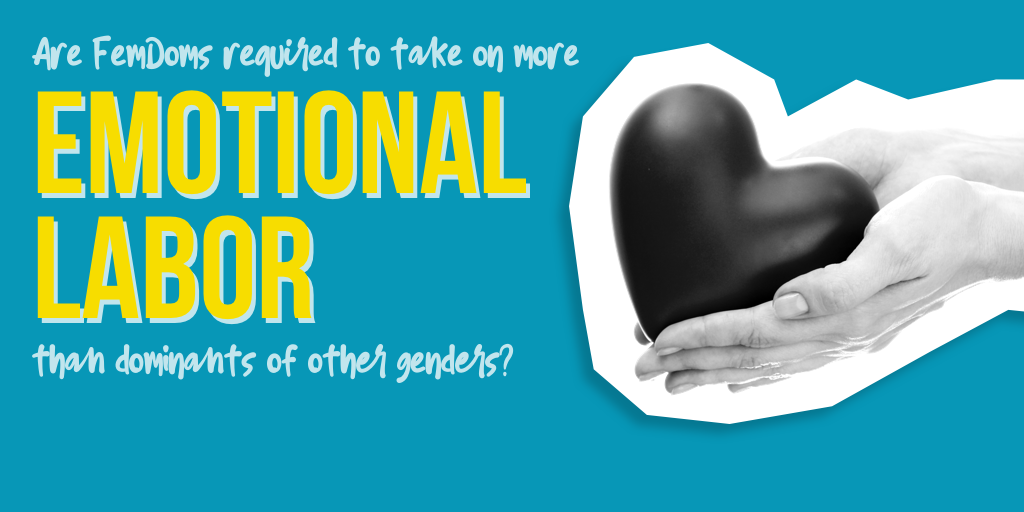Quick answer: No. But they often do, and it’s pretty much sort of expected of them.
If that’s enough for you, Have a wonderful day and come read me (or listen) another time! smiles
If you want more, let’s dig in.
Because that’s what I do, yannow.
smiles
First, what is emotional labor?
I’m going to go with with two pretty basic definitions:
the mental activity required to manage or perform the routine tasks necessary for maintaining relationships
the management of one’s emotions in order to present oneself and interact with other people in a certain way
To clarify, this usually means someone manages their own emotions in a relationship while also trying to manage their partner’s, to keep everyone “happy.”
Go along.
Get along.
Don’t rock the boat.
And taking on a role like this can be incredibly draining.
You know what else it is? Co-fucking-dependent. Because the person performing emotional labor feels like they “have to, or the relationship will fail,” thereby getting what they want—to feel important and needed.
deep sigh
OK. So do FemDoms take on more emotional labor than dominants of other genders?
Maybe.
I do know many feel they do.
And probably with VERY good reason. After all, women and femmes in general in western society (and many others) are given more emotional labor than men.
Want to know more about the science?
Here is a search for scholarly articles: https://scholar.google.com/scholar?q=women+emotional+labor&hl=en&as_sdt=0&as_vis=1&oi=scholart
Here is a layperson guide to some examples of emotional labor “required” of women and femmes: https://thebodyisnotanapology.com/magazine/50-ways-people-expect-constant-emotional-labor-from-women-and-femmes/
So, whether this is because we take it on, because we are considered better at it, because the genders are socialized to believe that men are neanderthals and only the women can save them from themselves, or maybe a combination of all of those things—it doesn’t matter.
What DOES matter is how the genders may CHOOSE to take on and distribute labor in their relationships, power exchange or otherwise.
For the sake of this writing, let’s pretend that we can all agree that there is an imbalanced expectation of greater emotional labor from women and femmes.
Right?
Good.
Now, one thing that is true of most FemDoms (or other women in charge) is that they have been socialized just like everyone else.
And socialization is fucking HARD to break, y’all!
And you know what else?
The partners of these dominant women and femmes are ALSO socialized. And if they are not women and femmes, they are probably lacking the skills to take on emotional labor and the understanding that it even really exists.
What a bunch of poop!
So, that causes a lot of problems.
EVEN for those who are trying to live a different life.
Because socialization. Because even while turning the traditional M/f relationship dynamic on it’s head, many dominant women are still caught in the same patterns of pleasing and “going along” and “smoothing things over” that they were taught, because they have also been taught that the opposite of that is to be a bitch, and they are not that.
Where, really, both of those are on the SAME side of a toxic patriarchal mindset, while the other side is a woman confident in herself, with good boundaries, and fully able to pursue and realize exactly what she wants in life without hating men or mothering them.
And when FemDoms realize what’s going on they feel trapped.
And they have a right to complain, because, well, it’s shitty.
But they are not REQUIRED to take that emotional labor on.
Of course not.
It’s probably just that they have, and now that they have a relationship with that pattern, they don’t know how to stop.
Or, they don’t know how to stop without ruining what they do have.
And their partner(s) may feel betrayed or upset that the rules are changing if they try. Because, well, things have started a certain way, and now they are being asked to learn and do more.
And that’s where it gets sticky.
FOR ANYONE WHO IS IN THIS POSITION.
Because, let me be clear: There are people of all genders who are more emotionally intelligent or stable or responsible, who take on more than their fair share of emotional labor in relationships.
Masculine dominants can get caught in this same trap. They must make everything right, never make mistakes, be properly compassionate and loving, cater to the sub (who many say is “really” in charge—even though that’s utter malarkey), and powerfully succeed in every aspect of life OR they are a beta man, giving everything up to their betters.
The truth is that men can be and do what they want to live their best lives across a range of behaviors, and not fall into the cocky-loud-alpha-domineering trap.
But that’s a hard space to work towards when you can’t understand it.
So, no matter the gender or the role, taking on too much emotional labor sucks.
How do I offload emotional labor?
This is a two part answer. 1. What to do when starting new relationships. 2. What do do in existing relationships.
Let’s start with starting fresh.
The first thing to do is educate yourself on emotional labor. What is it? What does it look like? How have YOU taken on emotional labor in your life?
Then, set boundaries around emotional labor. What are you willing to take on and what are you not willing?
As you interact with new people, practice maintaining those boundaries, and recognizing when emotional labor is creeping in that you do not consent to.
Simply refuse to take on the responsibility for maintaining other’s emotions.
You will probably have to practice quite a bit more emotional skills in managing your own emotions while you do this, to find the balance of refusing to take on their emotional labor while also not putting your emotional labor onto others.
It’s a challenge, but with practice, you can do it.
In an existing relationship.
The first thing to do is educate yourself on emotional labor. What is it? What does it look like? How have YOU taken on emotional labor in your life?
Then, set boundaries around emotional labor. What are you willing to take on and what are you not willing?
Hopefully, you’ve done these things to help reduce emotional labor in your new relationships, but if not, start here.
Identify an area in your life where you feel like you take on too much emotional labor that is fairly frequent. You’ll want to pick something that gives you practice in handling it.
Decide for yourself what the ideal outcome is.
Discuss with your partner how you feel and the steps you will take to reduce that emotional load. This may include discussing the steps they can take to help.
Your partner may resist. This is natural. If you’re in an established relationship dynamic with ingrained habits and patterns, you’ll probably find that it’s harder to effect change.
But not impossible.
If they have not been taking on that labor, though, they may not yet have the skills to do so, and it’s certainly not a habit, so be clear and have some patience as they learn and grow, but also be firm and maintain your boundaries.
You will probably have to practice quite a bit more emotional skills in managing your own emotions while you do this, to find the balance of refusing to take on their emotional labor while also not putting your emotional labor onto your partner(s).
It’s a challenge, but with practice, you can do it.
You’ll probably learn a lot about changing relationship dynamics. Including that you will find yourself automatically slipping into old patterns again, just like your partner.
Don’t blame them.
Don’t let them blame you.
You are in this together, a team, looking for a way to find the best balance for both of you.
What if my partner will not take their fair share?
Well, that’s not a question I’m willing to answer for you.
For me, the answer is this:
I want a partner who is willing to do their share and follow my lead, and who will show me that they love me by collaborating on the best woman-led relationship possible for BOTH of us.
Someone who won’t make those changes is going to fall far short of that for me.
What are your thoughts?
How have YOU taken on emotional labor in your life and your relationships?
Do you have emotional labor points that you’d like to change in your current dynamics? Do you feel like you can plan the steps needed to make those changes?









